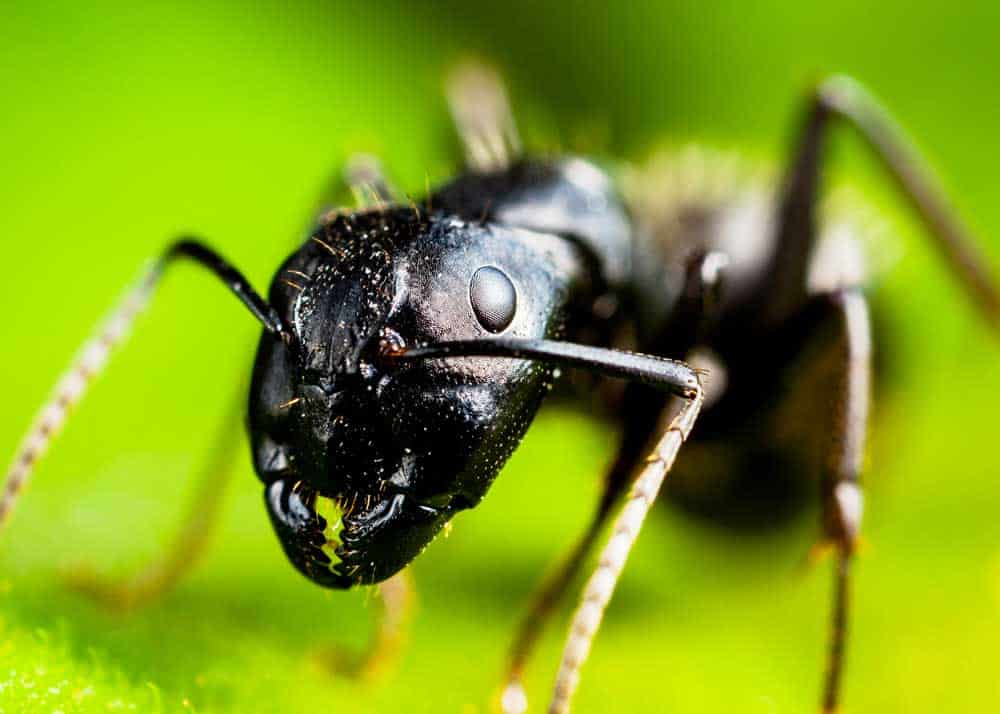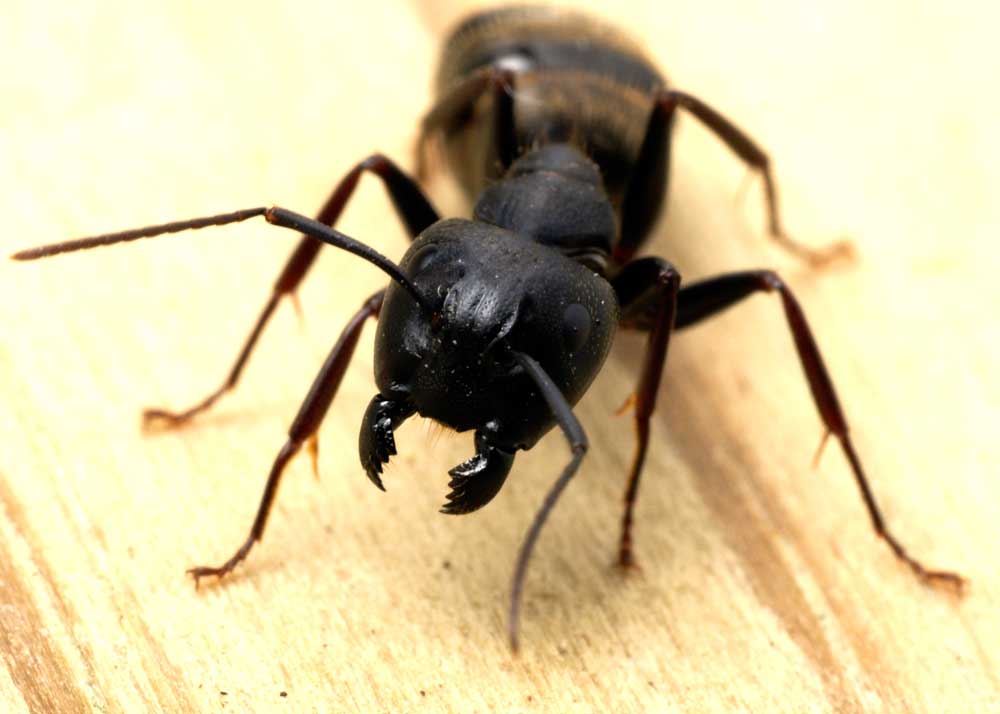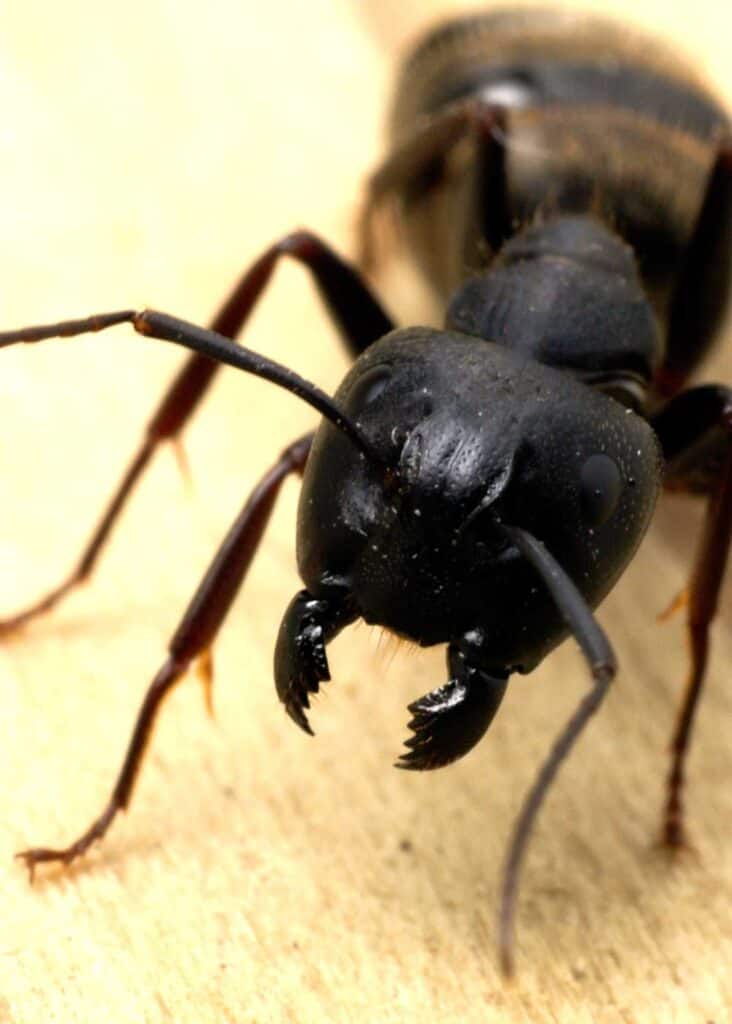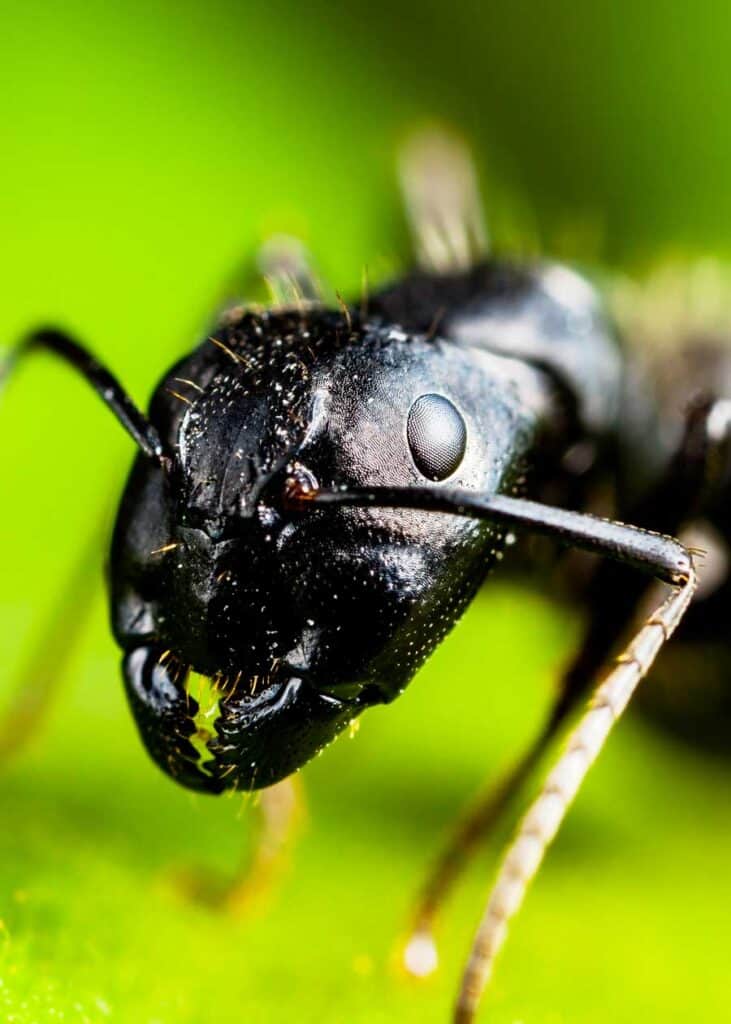Carpenter ants live in forested areas around the world. They can be aggressive when defending their nest. Do carpenter ants bite? And how serious is the bite of a carpenter ant? Here are the signs of a carpenter ant bite and how to treat it. As well as when to see a doctor and how to avoid those bites.
Carpenter ants will bite humans in self-defense. Often they will bite to defend their nest. Carpenter ants aren’t venomous but do produce formic acid that can cause a burning sensation. Carpenter ant bites seldomly require medical attention, but some people can be allergic to formic acid.

Table of Contents
Do Carpenter Ants Bite?
Though carpenter ants bite, they do not bite the same way that other bugs do.
These ants have jaws that are strong enough to bite and chew through wood, which is their main source of food. They will clamp down on your skin and use their mandibles to bite or chew through your skin.
Carpenter ants also produce formic acid when they bite. You may see some blood at the bite spot and feel some mild pain.
Do Flying Carpenter Ants Bite?
Male carpenter ants have wings and they will bite humans. The bite of a flying carpenter ant is the same as a crawling carpenter ant.
Learn more about flying ants.
Why Does it Burn?
The most common side effect of a carpenter ant bite is a burning sensation. This occurs due to the formic acid produced by the ant.
The ant will actually vomit the substance into the wound, which is how you know you suffered a bite.
Many compare the feeling to that of a bee sting. It should only last for a few minutes up to a few hours.
Why Do Ants Use Formic Acid?
Formic acid is a repellent used by carpenter ants.
Because of the irritation caused by formic acid in the fresh bite, it causes invaders – from monkeys to humans – to quickly leave the area.
Can Formic Acid Cause an Allergic Reaction?
According to American Entomologist, formic acid can cause an anaphylactic reaction.

Treating Your Carpenter Ant Bite
Unlike other types of ants that can cause a lot of damage, carpenter ant bites are usually mild and relatively harmless.
When you receive a bite from one ant, the spot can swell and/or turn red.
You usually do not need to do a lot to care for your bite. Apply antibiotic ointment to the spot and cover it with a clean bandage.
Make sure that you change the bandage once a day and watch for signs of an infection.
As soon as you suffer a carpenter ant bite, take time to clean the wound. Use ordinary soap and water or a wound disinfectant. You’ll then apply your ointment and a bandage.
A small number of people experience pain from these bites and find it helpful to take ibuprofen or a similar over-the-counter medication.
Keep in mind that carpenter ant bites are not venomous but may feel itchy, especially if you have an allergic reaction to the bite.
When to See a Doctor
Though not common, it is possible to have an allergy to carpenter ant bites.
Those with an allergy should see a doctor after receiving a bite.
- You may not know you have an allergy until you experience symptoms such as hives and skin that appear flushed or paler than normal.
- An allergy can also make you feel nauseous and/or dizzy and cause diarrhea or vomiting.
- If your pulse becomes rapid or slows after a bite, it’s also a symptom of an allergic reaction.
- Other symptoms include trouble breathing and swelling of your tongue, face and/or throat.
If you have access to allergy medication, take that before seeing a doctor.
You may find it helpful to use a gel or lotion to combat your swelling and pills that help with other symptoms.
You should see a doctor if you experience pain that worsens or notice more redness and swelling around the bite.
Also, contact a doctor if you develop a fever that you cannot control.
Learn more about little black bugs that bite.

More reading: 11 Ways to Treat Sand Flea Bites
How to Avoid Carpenter Ant Bites
Getting rid of the ant colonies around your home is the best way to avoid carpenter ant bites.
Eliminate any water sources they use such as a leaking toilet in your bathroom or a leaky faucet in your kitchen. If you have any leaks in your home, check the wood nearby.
That wood can become weak from water damage and create a buffet for the ants. You’ll need to replace those areas.
You should then head outside and look for woodpiles that are close to your home. Not only do you need to get rid of those or move them, but you’ll also want to look for signs that carpenter ants ate parts of playhouses and sheds.
Any trees and plants that are close to your home create the perfect place for ants to live until they can enter your home. Make sure that you also look for any cracks in your windows or doors that let the ants come inside.
Ant spray is a great product that kills carpenter ants and will keep them from biting you. You should use caution when spraying the chemicals if you have kids and/or pets.
This spray by Ortho gives 12 months of protection and is good for ants, cockroaches, fleas, and more.
There are also homemade remedies that work on these ants.
One of the more popular recipes uses water and sugar to attract ants and boric acid, which kills them. Don’t forget about insect repellents either.
These repellents are handy if you spend time outside.
Always avoid carpenter ant colonies to avoid bites, too.
Here’s more about how to get rid of carpenter ants.

More Reading: 4 Types of Sugar Ants (How to Get Rid of Them)
Take Care of Carpenter Bites
The basic answer to do carpenter ants bite is that yes, they do bite.
Their bites are not poisonous but can cause some irritation and itchiness, especially if you have an allergic reaction. Knowing how to get rid of the ants and treat your bite can help you avoid their bites and keep one from growing out of control.
- About the Author
- Latest Posts
Bryan Haines is a co-founder and writer at The Buginator. And is working to make it the best resource for taking back the outdoors from biting, stinging pests.
He also blogs about travel at Storyteller.Travel and photography at Storyteller Tech. Bryan is a partner at Storyteller Media, a publishing company he runs with his wife, Dena.
